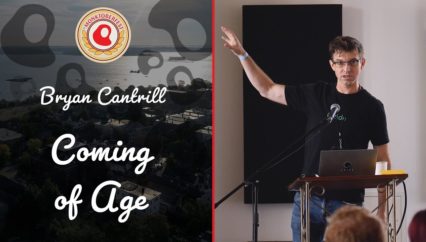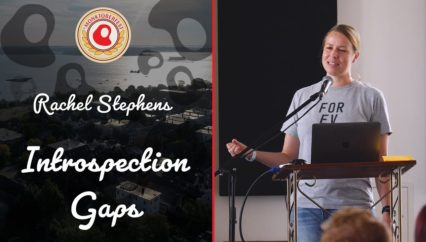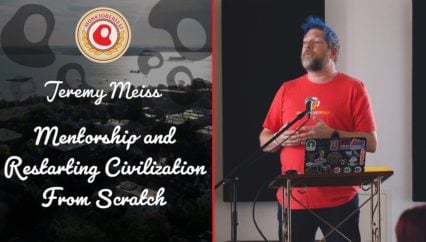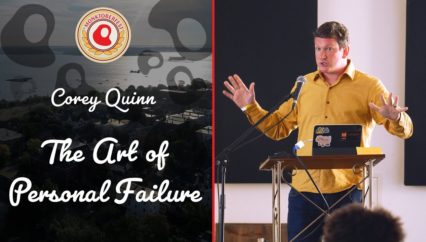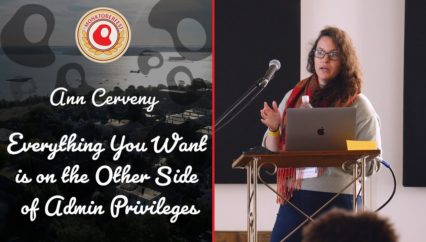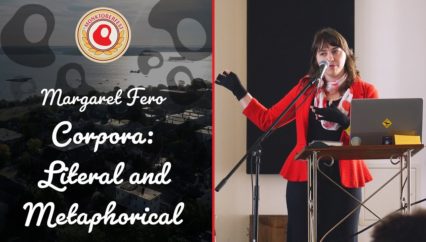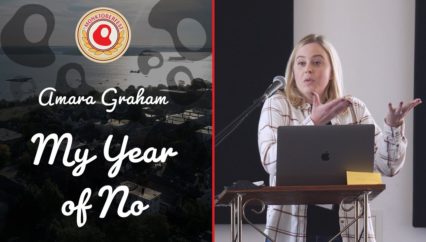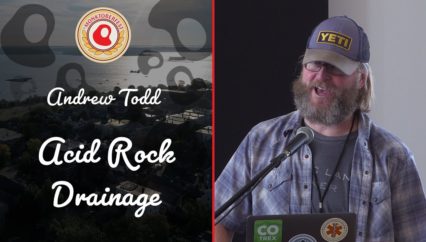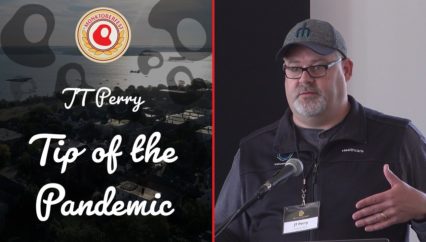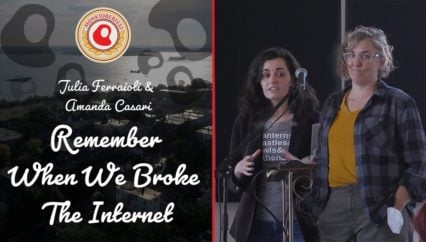Where would you end up if you chose to where to live and work based on a spreadsheet? This talk is both about that process and all sorts of interesting reasons certain metros were decided against, as well as how it is possible to be intentional and uncompromising about the things that really matter to you — and still do things like raise lots of money from venture capitalists and innovate on everything from anywhere.
Transcript
This is the worst speaking spot I’ve ever had in my life. Can’t believe I have to talk after that. I mean I agree with James, that I’m ready to just drink, I don’t see any need … um, great, so I don’t know if you know Josh Browder, I don’t recommend following him on Twitter, it’s not a useful thing to do, I don’t think he’ll watch this talk, but I think this is really great and representative.
Because Josh, in my estimation — I don’t like to yuck anyone’s yum, guys, and he really wants to be an influencer, he would really like to be that thought leader, the contrarian investor, but there’s something that feels a little like middle school to what he said here and what I’ve certainly witnessed on Twitter in the venture community, in the tech community, over the past few years, which is that, if where you live sucks, it’s usually about taxes, why would we subsidize, I don’t know, community goods and be citizens, like it’s our money right? And so we get upset or not we, but the Twitterati and decide we’re going to move, there are only three places to move, you can move to the peninsula, Miami, Austin is cool, maybe LA, maybe Denver, New York and this is where you go, right? And it’s been amazing to me over my loof life to meet lots of who are contrarian investors, who do the research, who really understand things, who have no such application to geography at all.
How do I go to the next slide in Google Slides? This is fun.
OK.
So I asked this question: And my cofounder asked this question, which was what if you took an intentional view into where you lived? What if you asked, if I’m going to move, and my cofounder and I lived in different places so one of us have to move and he said well I’m the CEO so you have to move but instead he was intentionally about. What if we pulled data what if we visited places and what if we thought about it?
And so I go on Twitter somewhat regularly and I asked people about this. And I think the answer that I resoundingly get back is, no, fuck you, that’s stupid.
[laughter]
So Alex Cohen, who is a great follow. I recommend following both Chris Munns and Alex Cohen, when I asked Alex Cohen about this, he wrote this, ha ha ha ha, I hate California and San Francisco and everything about it but I won’t move to Ohio. And Chris Munns and again, I love Chris, talked about the devastating part about being young in this economy, not owning a house and saying we have a real housing crisis. We have a wage problem where our wages can’t pay for houses and when I asked him, why don’t you move somewhere, like the Midwest, say? Where you could have higher wages relative to housing, he wrote back, literally: We can’t just move somewhere where housing would be more affordable and wages would be higher to solve our problem of wages and housing.
Like, there is something very broken in our brains when you make this kind of statement.
I mean I can’t solve — why do you say I can solve the pain in my foot from the splinter by removing the splinter. It makes no sense.
It just gets dismissed out of hand. That there are cool places to live, and there are not-cool places to live and you’re going to move to the cool places, because it’s middle school, and moving’s hard, right? And I’m going to talk about this more. Moving is hard.
So this is a talk entitled: Why we chose Columbus.
By the way, this is a shirt from the Columbus Bluebirds but homage the wonderful t-shirt company I recommend you buy lots of things from the company based in Columbus and the original homage crew hoodie, who am I? All right, so my name is Joe Emison, I also went to Williams College, so strong recommendation for there, although after Stephen, and anyway, so at Branch.com, we sell home, renters auto and umbrella insurance and though this is not the thing that I would start with first, but it is often used as a point of validation, we were recently valued at over a billion-dollar, we’ve raised over $250 million dollars will, we are a successful venture-backed startup based in Columbus. We have about 450 employees now. We’re hiring. We sponsored the job board. And we’re also native remote. So you don’t actually have to move to Columbus although about a third of our employees live in Ohio, about half live in the Midwest. You don’t have to move to Columbus if you work for Branch, but you will definitely be happier and wealthier if you do. So I’m going to give this talk in several sections. This is not what we did. This is if I were to do it again, what would I do? Because it’s always better, you know, when you tile a bathroom the first time, you see every flaw because you’re terrible at it and you tile a bathroom the second time and you’re like, I’m good at this.
The good news is at the end of this talk I will give you links to download Excel spreadsheets to download lots of data that we spent lots of time and money and I will also say that it may not exist for very long, because I’m just say licensing, so just get ready at the end of this talk to type something in while it exists.
OK, so these are the criteria if write doing this again today that I would look at. And we’re going to go through and give the analysis, and here’s the funny thing: I did this again for this talk.
And I did not know — I mean I did not cook the books. I promise you. I laid out criteria, I went, I pulled the data, and the answer will not surprise you.
So number one — and so these are the criteria, we are going to go through them slide by slide.
So how do we get a large metro that is growing? Now, look, I love Portland, I lived most of my life in Asheville, North Carolina, so it’s obviously not one of the top 12 metros, starting this company for us as a national insurance can, we needed to have an airport that went a decent number of places and not the hell that Stephen goes through every time he gets on a plane, we could have gone to Chicago, but it didn’t meet the criteria! So you know, we needed a certain size and I was ready to live in a company personally and as a company. Even though we are native remote, it is very useful for us, at least to have a home base. I’m telling you a personal journey and this does feel like a personal journey, Monktoberfest, right? It’s not metaphor fest this year, this is the personal journey that I hope some of the data I have may be useful for you or just some of the journey. So I would expect everyone doing this analysis to come out to the same result although I think a lot of you will consider Columbus in a way that you wouldn’t before, which is my hope.
So as a startup founder, this is my 6th company, I see so much value in things that grow versus things that are not growing or shrinking.
And if I were to give one piece of professional advice to anyone, it would be go places where things are growing. There are more resources, there is more available, you can grow into things. As soon as you go to things that are not growing or shrinking, it is a zero sum or a negative sum game, and you’re fighting for — when you get more, someone else gets less, it’s a much less cohesive environment. If you go to growth, everyone can win.
So I think — that’s the simplest way I can explain why I care about growing metros, there are a bunch of other reasons to care that are all kind of aligned with those. But of the top 50 metros by size, these are the ones that are growing. Now, growing at least 5% between 2015 and 2020. So you can decide, that’s an arbitrary threshold, right? I wanted to draw a line somewhere, I thought 5% was enough. Again, that’s 2015 to 2020, you can look more recently, the data wasn’t really good that was more recent.
OK, so what’s next? This one I think is the most important criteria, if you were starting a company and you were hiring people today. I think that our housing crisis in the US today is the single worst thing that we have and the single thing that makes certainly the employees that we have, the most anxious and impacts their happiness the most. So again, there’s an arbitrary threshold here, so I pulled — and one of the things the data on median housing price is terrible if you use census data. It’s wrong, it will tell you that the median house price in the New York metro is $200,000. It’s just a lie. Zillow, on the other hand, is actually quite good especially within their data. This is after all the runups, this is after Austin’s doubled or more than that after the pandemic.
I divided by the median income — now, that median income data is pretty good from the census and I pulled lots of this data. We spent 18 months pulling all that data and looking at it and seeing if it was good. What you can see is, all of the metros here have a median housing price divided by median income of 7 or less. So 7 years of median income can buy the median housing price. That roughly correlates with being able to get a mortgage on that income, although we could debate that. Again, you could draw your own lines. The Green Mountain Power ones were the ones that were growing. So immediately we have a massive cut-down, so if you agreed, growing metro affordable housing, we’ve cut it down to a very small number right now.
I also want to point out, and this is one of the things when people rate metros. They’re people who did no thought, no research, came up with terrible scores. You should pick thresholds and everything above the threshold qualifies. This is approval voting for metro selection, you don’t want some weird outlier to go drive the rest of the results because you created some weird scoring metric.
There is something really important to note, though. Different metros are wildly different in size, and so some of the things that make, like, Nashville affordable — Nashville, I don’t think, is affordable at all, but the problem is that the metro is huge, so it goes out like two hours commute time, so you’re just so far away from it, so it still qualifies here, but that’s OK, we introduce commute time as a qualifier to help deal with that.
OK.
Schools: I strongly believe that what we want to provide is if you join Branch and we pay 75th percentile of the Midwest for salary, when you join you should be able to, if you live in Columbus, you should be able to buy on the salary you’re provided at any level at Branch, you should be able to buy a home that you can have three children in, it can be a 20-minute or less ride from the office if you want to come in, during rush hour and you should be able to send your kids to good public schools, too. That’s the goal here, and so this data is difficult on the public schools data, US news seems to have the best data on this.
And finally, if we look at commute times, and we want to have a commute time of 25 minutes or less, again, completely arbitrary, you can look at what these values are, even if you bring this up to 30, I don’t know if you get anybody else? , the only metro that hits all of these criteria is Columbus. So you can go play with this data, look at it, but to me, these are the things that matter.
And these are the things that we are that were really important when we did our analysis.
OK, so you’re going to get this, but OK, that’s not what we did. We did something that was way harder and way more work and we pulled way more data. And so let me tell you about that.
So my cofounder and I lived in different cities, I lived in Asheville, he lived in North Royalton so we were both married with three children, each, mine are slightly older. I have two 12-year-old twins, boy, girl, and an 8-year-old girl and his are slightly younger, no twins.
I didn’t I didn’t want to move to Asheville. At the time when we were talking about it, my wife said other things, I do not want to be a fucking Ohioan and I’m not fucking moving to Ohio. Now, had my wife been to Ohio? No, but she definitely knew it wasn’t cool and did not want to move there. She was like, we’re coastal elitists and we can’t do that. Which I very much empathized with. Everything she said, I was like, yes, I know, I feel that natively, emotionally, as well.
But we decided — and my cofounder is the highly rational, data-driven one, although I’m the CTO and president, hes he’s the CEO, but he’s very much let’s add up these numbers and have formulas, and so his view was, let us go to the place that maximizes our ability to be a successful personal lines insurance company. I don’t know if you’ve shopped for home and auto — no you’ve all shopped for home and/or auto insurance I’m sure and I’m positive you bought the cheapest option that you thought was going to be around tomorrow. It is a price-sensitive market, period. Apartment the very beginning, you get a bunch of options, you’re shopping around, you’re picking the cheapest one. And so being able to be located in a cheaper metro means we can be more price competitive and in fact my cofounder built the esurance market in San Francisco. And that’s just more expensive if you’re trying to run it in San Francisco.
We pulled a lot of data. There are 100 columns, I think, in this spreadsheet. By the way, we haven’t mentioned weather. I just want to take a brief note and say, almost everywhere, except for Southern California, has some shitty months of the year, OK? I mean just because you moved to Texas doesn’t mean that it’s fun 12 months a year. I — when we looked at moving to Columbus, what I noticed is the median temperature was the exact same as Asheville, North Carolina, for nine months out of the year, and in fact it is, it is unfortunately more humid and the three months of the year that it is not, you know, miserable. I hate February. It’s not fun.
But that’s a very easy rational, intentional tradeoff to make for all of the other benefits that we’re getting.
So you’re going to be able to see this. I just want to demonstrate. We pulled this, this is 208 metros, unfortunately at some point along the way, we lost the very final version of this that did a bunch of scoring, but like the data is there, so you can play with the data.
After we — so we pulled the data of 208 markets, so that’s 150,000 population and above. We built an algorithm based upon all the criteria, so you’re going to see, like gun ownership — we were erring for less, by the way. Gay couples as a percentage of household, erring on more, etc. There were explicit decisions we were trying to make, where we were trying to hit a representative population of the US, and weighting these things in very arbitrary ways, by the way, in the ways that people rank metros that I don’t like, right, where you create some score and you say, this one is going to get this many points for this. This is why I gave you this other view of acceptable metros by certain criteria, I think is a better way to go.
Once we got to 21, we sent out this survey, and we sent it out to people we wanted to hire, and we asked them about the 21 metros we had selected — so this is the 21, you’ll be able to get this and see this if you want to see this — that we asked, would you move — this is preCovid, this is us saying we’re remote natives, saying, would you move to this metro if the right job opportunity was available. And we said yes, sort of approve or no, I would never move to this metro and then we had, I don’t know anything about this metro. Now, one metro had 100% of the people we asked said I would move there for a job. Anyone want to guess, what is the coolest metro on this list according to the world? It’s not Austin. We had like two disapproves on Austin? Anything? Where?
No, no, I think — I mean Dallas is probably like a 50/50. Nashville. People want to move to Nashville because they go for bachelor parties. I’m dubious whether it would be moving there with a family. I think it would be pretty cool to be single and living in the gulch, though.
But pret much, much all we got from Columbus was I don’t know, there are really not that many tourists, except for football games, but they constrain themselves to the highest idiom. So as a result of this we narrowed to four markets and we decided we were poem going to do one per state, based on the survey results so it was unfortunatein, Columbus, and rallee-Durham, so I got a resre license what I was concerned was we’re going to find metros that have good schools but the good schools are with the expensive houses or way far away. So I probably spent like 200 hours looking at what are the metros, what are the walk scores, what are the schools like, how far are they from downtown, how much do the houses cost and we went and visited those four and we visited all of those neighborhoods and we did like a rush-hour drive. I gotta tell you the only place we did not complete the rush hour drive was the E SRE told us that the rush hour drive two hours and 30 minutes later we had not made it to the neighborhood and we had to turn around to go to the airport. Nashville don’t have a state income tax and they have no way to pay for infrastructure so they try to pay the infrastructure by raising the and the Koch brothers spent hundreds of millions of dollars to defeat that so if you don’t have a way, Austin has much the same problem, if you have no way to tax your citizens and your citizens don’t like paying taxes if you have a growing metro, you will have a massive traffic problem and commuting problem — so having — and this also affects your public schools massively so having a state in which people actually pay taxes and are willing to pay taxes and there’s a political will to raise taxes and have taxes is necessary if you are in a growing metro. I mean just period. It’s just logic. Unfortunately politics today is not very tied to logic and so it is nice that Ohio, even though you might not think so, because of the way it’s divided up into many small locales, people do fund schools and pay taxes, largely because so much of the taxation happens at a local level. That seems to be the saving grace within Ohio and there’s general agreement for taxing.
OK, so we visited every city, we visited the Chamber of Commerce, we visited the people giving tax incentives, which my cofounder was really interested in and I was like, we’re a startup, we’re not going to get any tax incentives, although we have gotten wonderful tax incentives, so I do appreciate that, Ohio wonderful tax incentives, I will say and then …
We chose Columbus.
So in 2019, or we decided on Columbus in 2018, and honestly I visited with my family, he visited with his family and we got there and my wife was like, fuck! I like it. She was like, this place is pretty great. You know, you should visit. One of our investors is Dan Gilbert of Rocket, the company is Rocket Mortgages and he doesn’t try to sell people on Detroit until he brings them out. Now, I will tell you that Detroit of our 21 cities is where everyone said I’m not moving there so that’s why that didn’t qualify. So what have we learned? I really want to underline that moving was hard. People don’t do this because it’s hard, so I don’t want to sugarcoat that moving from a place where we had lots of friends and our kids had friends, I mean this was difficult.
You know, if you asked me or my wife right now, would you go back to Asheville? I mean the answer would be absolutely not. Like, Columbus is such a better place to raise our children. Our children are flourishing, they are so much more successful than they were in Asheville, the public schools — like, all the public schools available to us in Columbus — are lightyears better than the most expensive and best private school in Asheville. Like, it’s not close.
So we’re not leaving, because it’s the best metro in the US to raise a family and I just don’t think there’s a comparison, and we have friends all over the US, but it was really hard and difficult.
Another thing I want to underline is that hiring and retention has been very easy. It’s been easy for a couple of reasons.
So we went native remote in the pandemic. I mean, I understand, it’s still the pandemic, but let’s say we went native remote in 2020. We do hire a lot of people in Columbus, and in Ohio, but we have people all over the US. Most of the company does not live in Ohio.
And we — being present in a city in which you don’t have people constantly looking for new jobs and trying, you know, go on Blind and figure out how they can make more compensation by switching companies does mean you can invest a lot more in your employees and does mean you can be a lot more intentional about culture, because people will stick around.
So you can read my pinned tweet — I’ll have my Twitter handle up here shortly, but we start — so we have largely only hired junior developers, those positions actually for senior software developers are the first ones we’ve listed. So everyone we’ve hired from the beginning we’ve been their first job for most of them. We hired out of bootcamps. Now we run our own bootcamp. We pay for it. We try to find people who are out of work within Columbus, and if you take our bootcamp and you’re within Ohio, we pay you $200 a week to do the bootcamp, as long as you’re doing well enough. We offer an internship which is offered to teach you more and full-time employment within a year with competitive wages. So we have largely only hired junior developers, first job, we are now hiring a few experienced developers now that we have the culture set so we can weed out the typical tech bros who might show up. Austin was really our runner up at the time. We couldn’t have done this in Austin.
We got named the 13th best place to work in the US for a company of our size. The Glass Door reviews, people are like you’re either paying people or bribing them, but we’re not, and it’s great.
And this is our tech team. Mostly software developers, there are a few designers and Product Managers in here. As far as I know, I think we have the most diverse tech team of any tech startup valued at a billion dollars or more. We couldn’t have done this — I think it would have been incredibly harder to do this outside of Columbus, but this is what happens when you invest in junior developers and you build a farm team and you build your own company.
So, I would love for you, first of all, I would love for you to feel a little attacked with your choice of where you have lived and your lack of intentionality in choosing it. But I stand from the position of already having moved. And maybe Meg will attack me even worse for this. Maybe this is worse than the fitted sheet. No? Has a password, the password is the same as the wifi here, that was my cute way of not having the password in the video. You can also tag me if you need the password. That’s my Twitter handle. I would love to talk to anybody about Columbus or looking for metros and hiring junior developers and thank you very much.
[applause]
